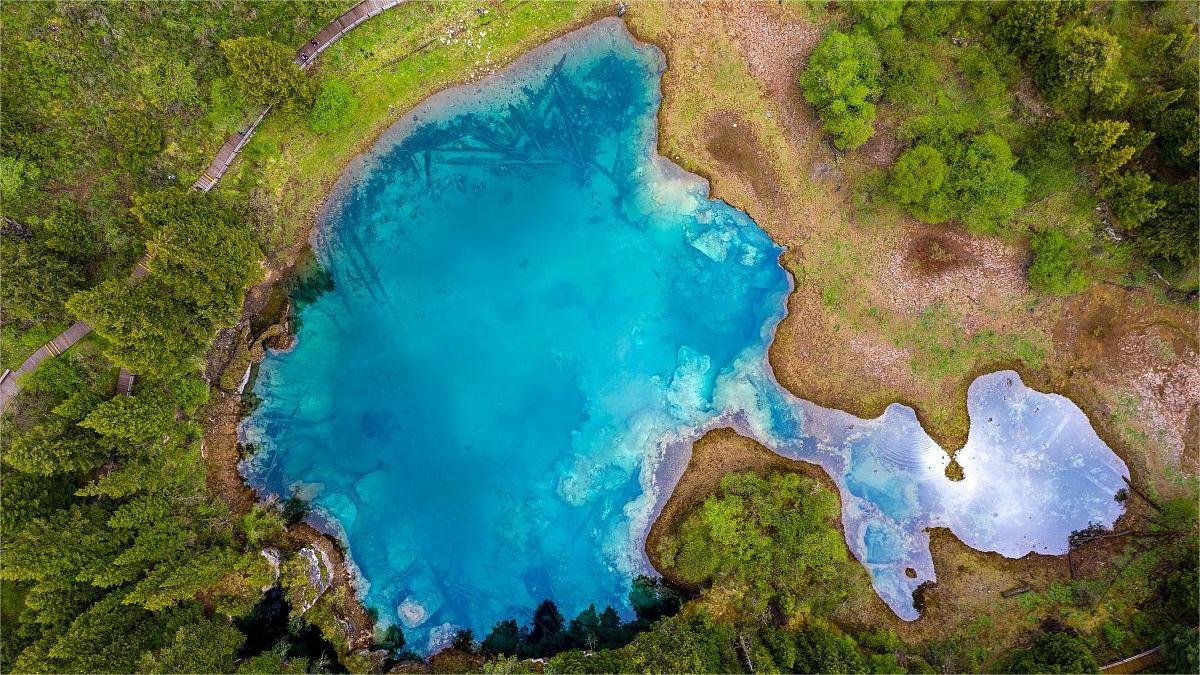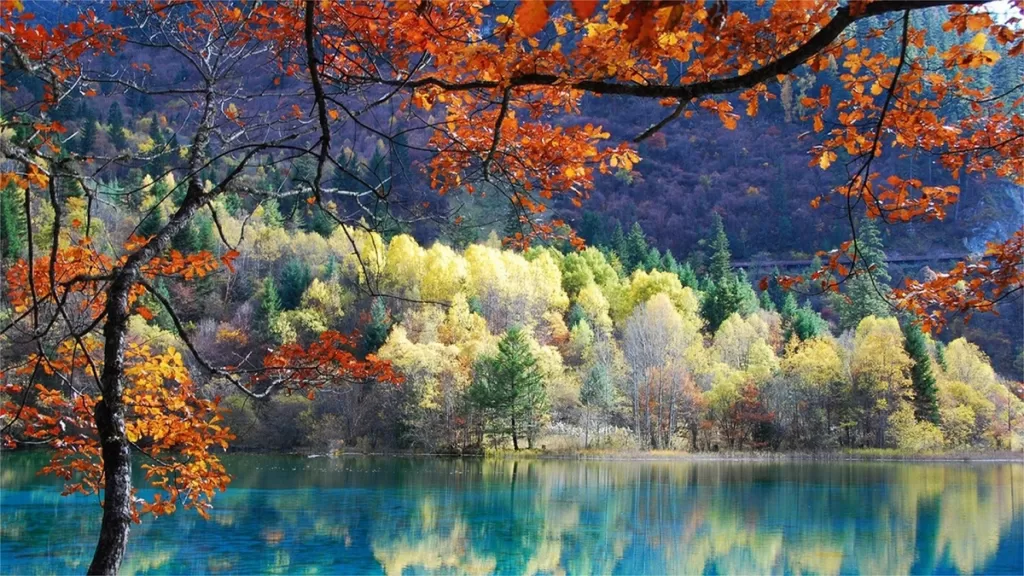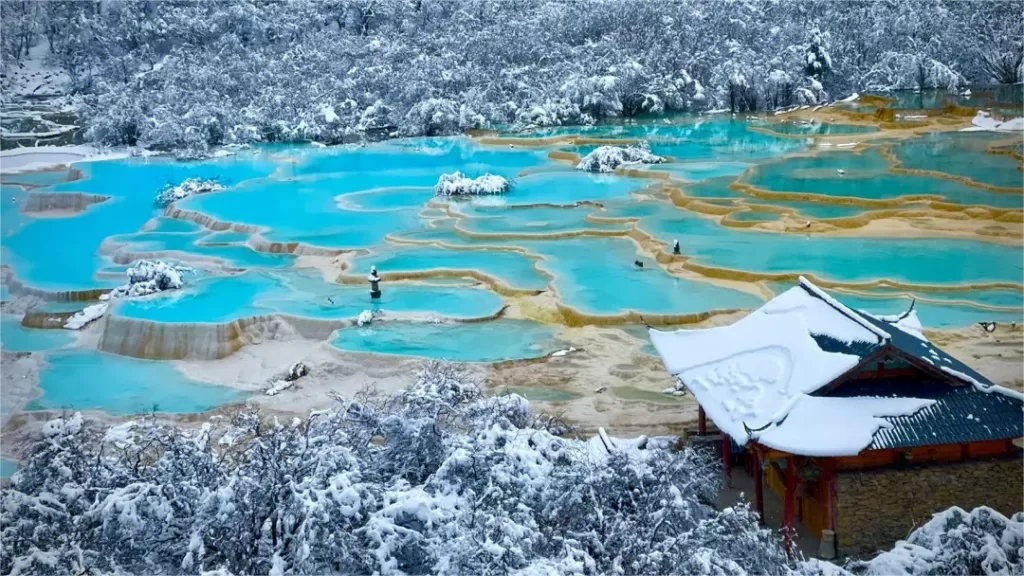Mounigou Valley Scenic Area (牟尼沟风景区, Mouni Valley) is nestled in Songpan County, Aba Tibetan and Qiang Autonomous Prefecture, Sichuan Province, covering an expansive 160 square kilometers. Ranging from 2,800 to 4,070 meters in elevation, the region experiences an average annual temperature of 7 degrees Celsius. It stands as a geological museum shaped by the rare karst (limestone) formations in the high-altitude and frigid mountainous terrain. The area showcases diverse calcium accumulations, displaying various forms of post-geological transformation that have given rise to a multitude of calcification landscapes.
Comprising two main sections, Zhaga Valley (扎嘎瀑布景区) and Erdao Lake Valley (二道海景区), the scenic landscape of Mounigou Valley seamlessly integrates calcified waterfalls, ring-shaped pool waterfalls, high-altitude karst collapse lakes, stalactites, caves, calcification remnants, pristine forests, alpine meadows, sulfur hot springs, and unique Tibetan Buddhist temples. Renowned as the “Five Wonders” of waterfalls, lakes, hot springs, stalactite columns, and folk customs, the area captivates visitors with its enchanting blend of natural beauty and cultural richness. Mounigou Valley stands as a geological marvel, harmonizing the extraordinary karst formations with the cultural tapestry of traditional Tibetan villages and the spiritual presence of Buddhist temples.
Table of Contents
- Basic Information
- Location and Transportation
- Highlights of Mounigou Valley
- Map of Mounigou Valley
- Vlog about Mounigou Valley
- Useful Tips from Reviews
- Attractions near Mounigou Valley
Basic Information
| Estimated Length of Tour | 1 day |
| Ticket Price | 100 RMB (1st April – 15th November) 60 RMB (16th November – 31st March the next year) |
| Opening Hours | 8.00 – 18.00 |
| Telephone Number | 0086-0837-7247053 |
Location and Transportation
Nestled in the enchanting province of Sichuan, China, the Mounigou Valley stands as a testament to nature’s splendor. Located in the northern part of the province, Mounigou Valley is embraced by the towering mountains and lush landscapes that characterize Sichuan’s breathtaking scenery.
Bordered by the Min Mountains to the east and the Jianmen Mountains to the west, the valley is embraced by an awe-inspiring topography. Its strategic location along the eastern edge of the Tibetan Plateau grants it a unique climate and ecology, giving rise to the vibrant forests, pristine waterways, and captivating geological formations that define the region.
Tourists from Chengdu can first take a coach at Chadianzi Bus Station (茶店子车站) and then transfer to local buses at Songpan County (松潘县). This journey takes more than 5 hours but allows you to enjoy the wonderful sceneries along the road.
Alternatively, tourists can first fly to Jiuzhai Huanglong Airport (九寨黄龙机场) and then transfer to a coach to cover the remaining 50 kilometers. This option saves enormous time but is a little expensive.
Highlights of Mounigou Valley
Zhaga Waterfall

Zhaga Waterfall is renowned as the most magnificent calcium carbonate waterfall in China. Standing at 104 meters in height and spanning 35 meters in width, it cascades with a speed of 23 meters per second down a colossal cascade of calcium deposits. The waterfall descends in three stages, with a mesmerizing water curtain cave in the middle of the first stage. This cave boasts a 6-meter high hall with an area of approximately 50 square meters, adorned with stalactites resembling pagodas and bamboo shoots.
About 4 kilometers downstream from the waterfall, the mountain stream transforms into a series of mesmerizing circular pools, resembling a string of beads, with crystal-clear water flowing over cascading calcium deposits, forming layers of concentric waterfalls.
Erdao Hai Lake

Erdao Hai, the largest lake within Mounigou Valley, spans 13,300 square meters, situated at the heart of the scenic area. It serves as the soul of the entire landscape, characterized by tranquil and serene waters with a majestic atmosphere. Tian’e Lake, covering approximately 13,300 square meters, boasts deep blue waters and derives its name from the frequent presence of wild ducks and swans. Baihua Lake, located 80 meters from Tian’e Lake, features calm and azure waters reflecting the surrounding mountains and greenery, earning its name from the abundance of water grass and small flowers during summer and autumn. In addition to these prominent lakes, the scenic area is adorned with over 400 lakes, each varying in size and shape, contributing to the diverse and captivating natural beauty of Mounigou Valley.
Ancient Temples

Mounigou Valley is home to Tibetan Buddhism, primarily of the Gelug sect, known as the “Yellow Sect,” with prominent ancient temples like Xiaobao Temple and Muni Back Temple. Established in the year 1549 AD, Xiaobao Temple spans an area of over 6,000 square meters. The temple is renowned for its “Buddha Stone,” a natural rock formation bearing Buddhist images, from which the name Xiaobao Temple is derived (“Xiao” meaning Buddha Stone and “Bao” representing the stone’s form in Tibetan). Muni Back Temple, founded in 1663, is backed by dense virgin forests, faces the majestic Zhaga Waterfall, and overlooks the scenic Longgang Valley. The temple houses a significant collection of precious Tibetan Buddhist artifacts, and large religious ceremonies are held annually on the 15th day of the first and seventh lunar months.
Zhuojin Festival

The Zhuojin Festival is celebrated annually on the 15th day of the fifth lunar month in Mounigou Valley. During this festival, the local Tibetan families, in their leisure time away from farming activities, don vibrant traditional attire and gather in groups ranging from a few to a dozen families, or even the entire village or nearby communities. They bring along their most delicious dishes and set up camps on spacious grasslands, indulging in leisure and recreation.
The festival features a rich array of activities, including traditional competitions like horse racing, yak racing, wrestling, chess matches, and more. Additionally, there are customary song and dance performances, such as the lively Guozhuang dance, tap dancing, and string dances. As night falls, bonfires illuminate the wilderness, around which people gather to roast whole sheep and enjoy local drinks, creating a festive atmosphere that captures the essence of community and cultural celebration in Mounigou Valley.
Hot Springs

Nestled amidst the natural splendor of the Mounigou Valley in Sichuan, China, are soothing hot springs that offer a tranquil retreat for weary souls. These geothermal wonders bubble forth from the earth, creating inviting pools of warmth and relaxation. Surrounded by lush foliage and serene landscapes, the hot springs provide a harmonious blend of natural beauty and therapeutic comfort. As nature’s gift to rejuvenation, these hot springs offer a serene escape, where visitors can unwind and bask in the embrace of warm waters
Map of Mounigou Valley

Vlog about Mounigou Valley
Useful Tips from Reviews
Hiking Considerations: While the hiking routes in Mounigou Valley are not long, reaching the top of the waterfall can be tiring. The review advises those susceptible to altitude sickness to be cautious and attentive to symptoms.
Less Crowded Destination: Mounigou Valley is described as a lesser-known attraction. It features Two Rivers Sea and the Zhaga Waterfall. During winter, Two Rivers Sea is closed, but the waterfall is open. The wooden walkway allows visitors to walk all the way to the base of the waterfall, providing a spectacular view.
Scenic Beauty and Cleanliness: The area is praised for its beauty with clear and pristine lake water. The nickname “Little Jiuzhaigou” indicates the resemblance to the famous Jiuzhaigou Valley. The cleanliness of the scenic area is commended, with well-maintained and clean restroom facilities available throughout the area.
Low Visitor Numbers: The review notes that there are very few people in the area. The serene atmosphere, combined with the beauty of the lake, makes it an enjoyable experience. The cleanliness of the area contributes to a relaxed visit.
Prepare Your Own Supplies: There are no shops within the scenic area, so visitors are advised to bring their own food and drinks.







The area of Mounigou Valley is vast, with the main attractions currently being Erdao Hai and Zhaga Waterfall. Erdao Hai features forests and lakes, resembling Jiuzhaigou, while the scenery of Zhaga Waterfall, with its travertine waterfalls, is more like Huanglong. It’s like a “mini Jiuzhaigou” and a “mini Huanglong.” And there are almost “0 tourists.” Do you know how amazing that is? Vast forests and grasslands seem to be prepared just for you. Occasionally, you can even see horses grazing.… Read more »